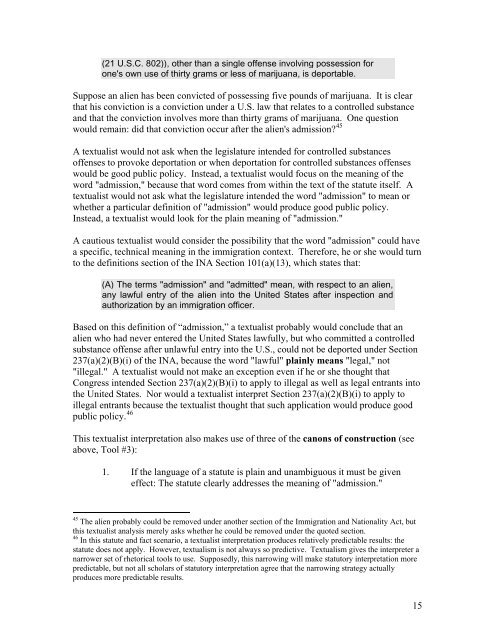Interpreting The Facts
Interpreting The Facts
Interpreting The Facts
Create successful ePaper yourself
Turn your PDF publications into a flip-book with our unique Google optimized e-Paper software.
(21 U.S.C. 802)), other than a single offense involving possession for<br />
one's own use of thirty grams or less of marijuana, is deportable.<br />
Suppose an alien has been convicted of possessing five pounds of marijuana. It is clear<br />
that his conviction is a conviction under a U.S. law that relates to a controlled substance<br />
and that the conviction involves more than thirty grams of marijuana. One question<br />
would remain: did that conviction occur after the alien's admission? 45<br />
A textualist would not ask when the legislature intended for controlled substances<br />
offenses to provoke deportation or when deportation for controlled substances offenses<br />
would be good public policy. Instead, a textualist would focus on the meaning of the<br />
word "admission," because that word comes from within the text of the statute itself. A<br />
textualist would not ask what the legislature intended the word "admission" to mean or<br />
whether a particular definition of "admission" would produce good public policy.<br />
Instead, a textualist would look for the plain meaning of "admission."<br />
A cautious textualist would consider the possibility that the word "admission" could have<br />
a specific, technical meaning in the immigration context. <strong>The</strong>refore, he or she would turn<br />
to the definitions section of the INA Section 101(a)(13), which states that:<br />
(A) <strong>The</strong> terms "admission" and "admitted" mean, with respect to an alien,<br />
any lawful entry of the alien into the United States after inspection and<br />
authorization by an immigration officer.<br />
Based on this definition of “admission,” a textualist probably would conclude that an<br />
alien who had never entered the United States lawfully, but who committed a controlled<br />
substance offense after unlawful entry into the U.S., could not be deported under Section<br />
237(a)(2)(B)(i) of the INA, because the word "lawful" plainly means "legal," not<br />
"illegal." A textualist would not make an exception even if he or she thought that<br />
Congress intended Section 237(a)(2)(B)(i) to apply to illegal as well as legal entrants into<br />
the United States. Nor would a textualist interpret Section 237(a)(2)(B)(i) to apply to<br />
illegal entrants because the textualist thought that such application would produce good<br />
public policy. 46<br />
This textualist interpretation also makes use of three of the canons of construction (see<br />
above, Tool #3):<br />
1. If the language of a statute is plain and unambiguous it must be given<br />
effect: <strong>The</strong> statute clearly addresses the meaning of "admission."<br />
45 <strong>The</strong> alien probably could be removed under another section of the Immigration and Nationality Act, but<br />
this textualist analysis merely asks whether he could be removed under the quoted section.<br />
46 In this statute and fact scenario, a textualist interpretation produces relatively predictable results: the<br />
statute does not apply. However, textualism is not always so predictive. Textualism gives the interpreter a<br />
narrower set of rhetorical tools to use. Supposedly, this narrowing will make statutory interpretation more<br />
predictable, but not all scholars of statutory interpretation agree that the narrowing strategy actually<br />
produces more predictable results.<br />
15

















